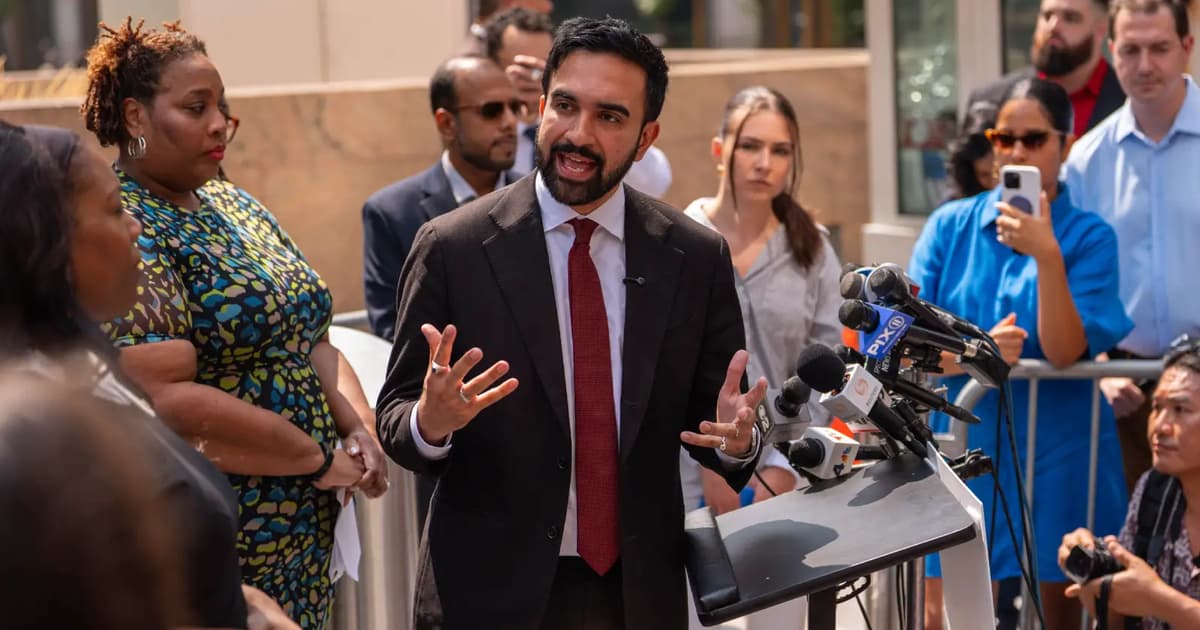
From Kua Kia Soong
In an era when politics has become synonymous with opportunism, spin, and compromise, Zohran Mamdani stands out as a rare figure – a politician who refuses to bend his ideals to fit the prevailing winds of expediency.
In the heart of capitalist America, this young New York assemblyman has emerged not merely as a rising star of the left but as a model of moral consistency.
Beyond his obvious talent, charisma, and youthful energy, three enduring qualities mark Mamdani as a politician of uncommon integrity: his fidelity to socialist principles, his fearless anti-imperialism, and his unyielding defence of the working class.
1. Integrity amid temptations of capitalism
To be a socialist in the US – the citadel of capitalism – is no small feat. To remain one, while sitting in the legislature of one of its richest cities, is even rarer. Yet Mamdani does so with clarity and conviction.
Representing a district in Queens, he champions universal housing, free public transit, and healthcare as rights, not privileges – all while surrounded by the lobbying machinery of Wall Street, real estate developers, and billion-dollar corporations.
While many politicians who start on the left have compromised their socialism and drifted toward the centre, Mamdani has remained steadfast. He has shown that principle is not incompatible with pragmatism, and that genuine public service means refusing to serve the capital.
His actions echo the socialist conviction that democracy must extend beyond the ballot box into the economy itself – a message too often diluted by career politicians who treat socialism as a slogan rather than a structure.
2. Integrity in the face of imperialist pressure
If Mamdani’s socialism makes him exceptional, his anti-imperialist courage places him in a class of his own.
Few American politicians dare to speak the truth about Palestine, and fewer still do so in New York, a city with more Jewish residents than Jerusalem and politicians on both sides of the divide are funded by Aipac, the American Israel Public Affairs Committee. Yet Mamdani has done exactly that, condemning the Israeli occupation and the ongoing genocide in Gaza with moral clarity and without equivocation.
His refusal to bow to the pressure of pro-Israel lobbies or to the fear of political ostracism demonstrates a level of moral integrity that transcends political calculation.
He reminds us that justice cannot be selective, that human rights do not end where donor interests begin, and that silence in the face of oppression is complicity. In this, Mamdani has become a beacon of conscience in a political landscape where even “progressives” often mute their criticism of imperialism when it threatens their careers.
Compare this to the sad spectacle in Malaysia, where many politicians who once called themselves “socialists” have lost their voice when it comes to the struggles of other nations such as Cuba and Venezuela still being sanctioned by US imperialism.
Having compromised themselves through alliances with liberal democratic parties and corporate elites, they have bartered away their anti-imperialist credentials for cabinet posts and patronage.
3. Consistency in defending the people
Mamdani’s third defining quality is his unwavering consistency in fighting for the working class – a struggle that pits him directly against billionaires, corporate landlords, and the political establishment that serves them.
Whether confronting New York’s real estate barons, opposing police overreach, or demanding public ownership of utilities, Mamdani has refused to be silenced or co-opted. His fight is not episodic or symbolic; it is structural and sustained.
In contrast, much of Malaysian politics has become theatre – populist gestures during elections followed by quiet accommodation with the very corporate powers they claim to oppose.
Developers and tycoons shape urban policy, while the needs of the poor are treated as afterthoughts. The few who once championed socialist causes have long since traded their red banners for the blue and yellow of liberal alliances, citing “realism” as justification for betrayal and afraid to tackle wealth inequality.
Mamdani, by contrast, embodies what realism should mean in politics: a commitment to the real lives of ordinary people, not to the illusions of market freedom. His integrity is not only moral but strategic, for he understands that the only durable politics is one rooted in justice and truth.
Why Mamdani succeeds where others falter
Mamdani’s success in New York points to several lessons for socialists in liberal democracies like Malaysia:
Authenticity builds trust
Voters, even in capitalist societies, respond to integrity. Mamdani’s refusal to pander has earned him credibility that transcends ideology. Malaysian socialists, too often preoccupied with tactical alliances, have lost the moral distinctiveness that once inspired working people.
Local struggles matter
Mamdani’s socialism begins in the community – rent justice, transport access, and public housing. By rooting socialist ideals in immediate community needs, he transforms abstract ideology into everyday relevance.
Malaysian socialists could regain traction by re-embedding themselves in grassroots economic and environmental struggles rather than electoral bargaining.
Moral courage is political strength
Mamdani’s unapologetic anti-imperialism and solidarity with Palestine in the face of Zionist aggression prove that moral courage can attract rather than alienate.
In Malaysia, where anti-imperialism once unified the left, such conviction has withered under the pressure of pragmatism. Mamdani’s example suggests that principled internationalism can still be a rallying force if pursued consistently.
Mamdani’s victory is a call to renewal
Mamdani embodies what politics can still be: principled, compassionate, and unafraid.
His brand of socialism – unapologetically moral, locally grounded, and globally conscious – is not nostalgia for a lost left but a blueprint for its renewal.
In an age when politicians everywhere are content to manage decline and compromise with the corrupt, Mamdani insists on imagining transformation.
His example challenges socialists in Malaysia and beyond to rediscover the courage of conviction – to believe, once again, that politics grounded in truth, integrity, and solidarity can still move the world.
At a time when cynicism has replaced conviction, Mamdani reminds us that socialist integrity itself is revolutionary.
His steadfastness in upholding socialist ideals, his moral courage in defending Palestine and other countries under imperialist threats, and his consistency in fighting for the working class are the very qualities that distinguish a politician from a careerist.
Malaysia – and indeed the world – needs more Zohran Mamdanis: leaders who do not count the cost of truth, who serve the people rather than their patrons, and who refuse to forget that politics, at its best, is the practice of hope grounded in justice, equality and democracy.
Kua Kia Soong is an academic, director of Suaram, and a former MP.
The views expressed are those of the writer and do not necessarily reflect those of FMT.






